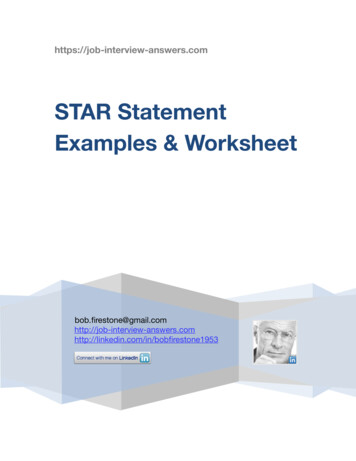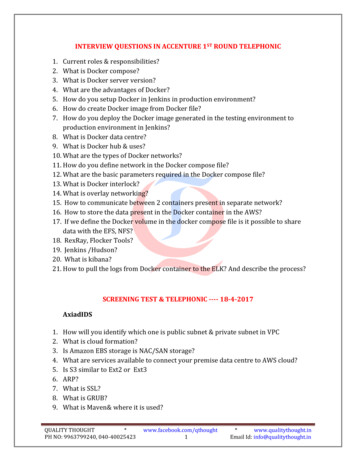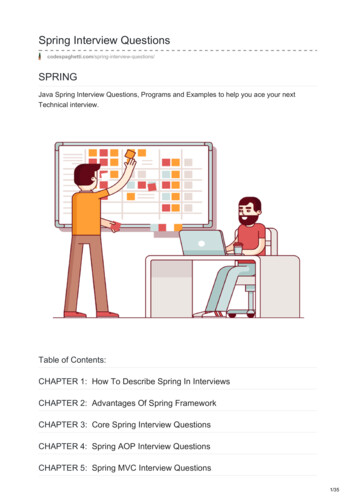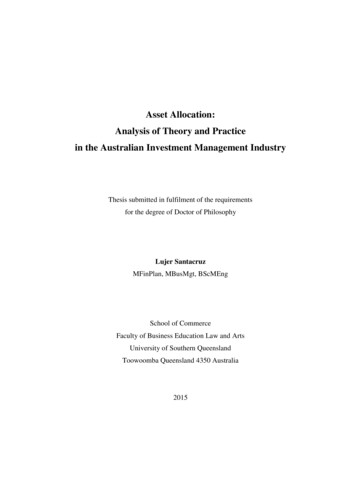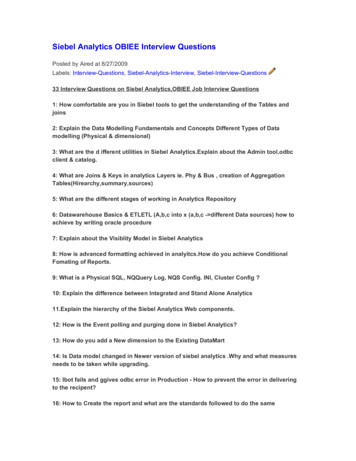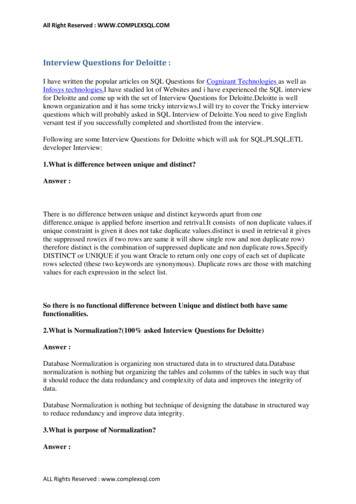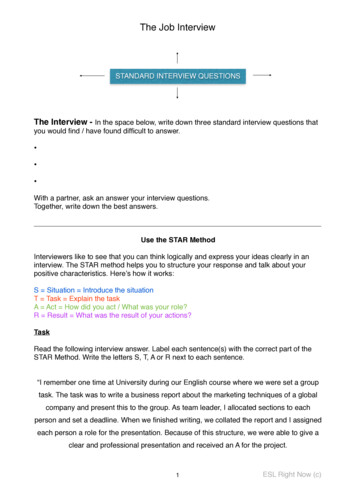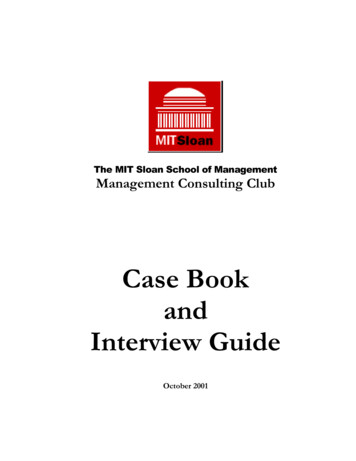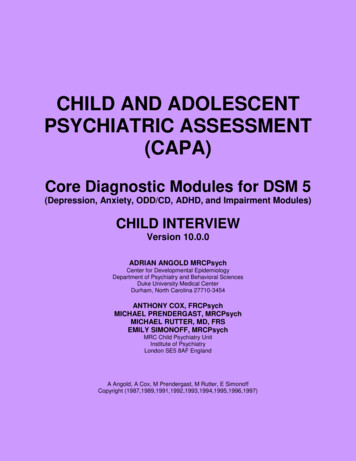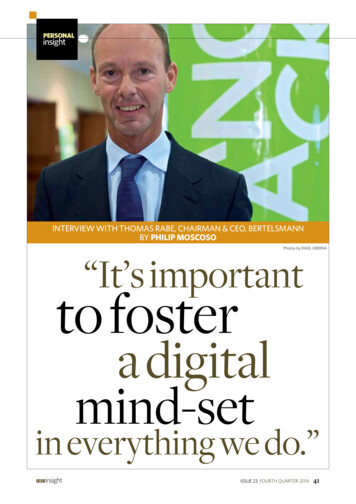
Transcription
personalinsightINTERVIEW WITH THOMAS RABE, CHAIRMAN & CEO, BERTELSMANNBy PHILIP MOSCOSOPhotos by RAÚL URBINA“It’s importantto fostera digitalmind-setin everything we do.”ieseinsightissue 23 fourth QUARTER 201441
Fit for the FutureBorn in Luxembourg, Thomas Rabe earned adoctorate in economics from the University ofCologne before starting his career practicingcorporate law in Brussels and then workingfor a venture capital firm in Berlin. In 2000 hebecame CFO of Radio Television Luxembourg(RTL), the leading European broadcastinggroup majority-owned by the Bertelsmannmedia conglomerate. After six years, hebecame CFO of Bertelsmann itself, and withinthe Executive Board was also responsible forBertelsmann’s music rights business, BMG.In 2012, he was named chairman and CEO ofBertelsmann. Since then, he has been workinghard to make the German family mediabusiness founded in the 19th century fit for thedigital realities of the 21st century.42fourth QUARTER 2014 issue 23ieseinsight
personal insightINTERVIEW WITH Thomas RabeThe Digital Revolution:It’s Not All Bad News for MediaAt a time when most media companiesare complaining about the challengingsituation facing the industry, ThomasRabe, the 49-year-old chairman andCEO of Bertelsmann, is refreshingly upbeat aboutthe future. In a special session moderated byProf. Philip Moscoso, Rabe told 3,000 executivesgathered in Madrid for IESE’s Global AlumniReunion that digital transformation presentedopportunities as well as challenges to traditionalmedia businesses like his.Take book publishing, the division on which theGerman family business was founded in 1835. Bymerging two former rivals, Bertelsmann has createdthe world’s largest publisher – Penguin RandomHouse – selling more than 700 million books,audiobooks and e-books worldwide. Bertelsmannbook publishers now generate more than 20 percentof their global revenues through digital, and in theUnited States this figure is 25 percent or higher.The same is happening in other Bertelsmann divisions: using apps to leaf through magazines published by Gruner Jahr; providing logistical supportin data management, digital distribution and digitalstorage to B2B clients through Arvato; and expanding digital print offerings through Be Printers.In addition, RTL Group is solidifying its position as Europe’s leading entertainment providerby thinking beyond television channels and radiostations to more video-on-demand services and“second screen” offerings via apps, to keep viewersengaged when using smartphones or tablets whilewatching television.“Media companies have felt the digital harbingers earlier than other industries,” Rabe wrote in arecent editorial. “The interiors of houses, cars andrefrigerators are just setting out for where television stations, books, magazines and music havealready arrived: in a continuously interconnected,data-driven online world. We are entering a new eraand have a great opportunity to shape its course.”The disruptive, dizzying nature of these technological shifts need not be reason to fret, providedthat companies understand the true potential ofthese technologies and leverage them intelligently.After all, “the billions of smartphones are just shellsthat need to be filled with creative content,” Rabewrote. In this sense, the digital revolution meansieseinsightthe consumption of media has never been greater.And for a producer of media content like Bertelsmann, this is something to be excited about.PHILIP MOSCOSO– The transformation to digital is astrategic priority for Bertelsmann over the nextdecade. What will the company look like 10years from now? What are the success factorsin this process of change?THOMAS RABE– We want to keep moving forward withour strategic priorities as successfully as we havedone over the past two and a half years, so that, 10years from now, Bertelsmann will be faster growing,more digital and more international than it is today,based on three pillars: media, services and education. This means strengthening our core mediaand services businesses, promoting their digitaltransformation, establishing and expanding newgrowth platforms, and generating a higher share ofrevenues in high-growth countries such as China,India and Brazil.You mentioned education as one of thepillars of your strategy. Why education, whichseems less conventional for a media company?TR– The rising demand for high-quality educationis a global megatrend – millions of people aroundthe world see education as the key to social inclusion. Already, the global education market has avolume of 5 trillion. It offers high growth rates forprivate-sector providers, and for Bertelsmann theoverlap with our expertise as a content and servicescompany is relatively large. We recently achievedour first strategic milestone with the acquisition ofthe U.S. e-learning provider, Relias Education.In the music industry, we are a few steps furtheralong. In 2008 we deliberately pulled out of the traditional recorded music business, because we feltthe structures and behavior patterns of the marketwere not capable of reform. Instead, we built BMGfrom scratch – a music rights business that catersperfectly to the needs of artists in the digital age. Weare already No. 4 in the market again. We hold rightsto more than a million songs and are the preferredpartner of such great artists as Mick Jagger andKeith Richards of The Rolling Stones. We would liketo repeat this success in the field of education in theyears ahead.PM–issue 23 fourth QUARTER 201443
personal insightINTERVIEW WITH Thomas RabeThe rising demand for high-quality education isa global megatrend. Already, the global educationmarket has a volume of 5 trillion.”Advances in software and technology willhave a substantial impact across Bertelsmann’sspectrum of businesses. What do you expectthe business models of traditional industries,such as television, publishing and music,to look like in the future? In particular, howdoes the issue of piracy need to be dealt with,especially in markets that do not share thesame understanding of intellectual property?TR– The development varies from one medium to thenext. In the TV business, the use of traditional linear TV services is still rather high. In Europe, for example, it averages 220 minutes a day per person. Sotelevision will remain an indispensable vehicle forlarge-scale ad campaigns in the foreseeable future.Of course, the various types of online video – fromon-demand to web originals to multi-channel networks – are also becoming increasingly important.This is why RTL Group has acquired majority stakesin companies such as Broadband TV (a multi-channel network), StyleHaul (a video network focusedon fashion and beauty content) and SpotXchange(a video advertising platform).In the book market, the e-book has become arobust, highly profitable business model for thedigital age, thanks to the existence of attractivee-commerce platforms and reading devices rightfrom the start. This is in contrast to music, whereecosystems have only recently emerged to properlystructure the market, whether in the form of storesor streaming services, which open up additionalopportunities for us.The protection of intellectual property is a fundamental issue that affects all creative works andcontent. Irrespective of national boundaries, weneed appropriate regulations that accept and reflectthe reality of media convergence. Our creativeminds deserve an up-to-date copyright law thatempowers us to be courageous and invest in newideas even in the digital age.PM–You identified China, India and Brazil asimportant to your future growth: What are yourplans there? And where does Europe fit as partof your future strategy?TR– We see attractive long-term prospects in China,India and Brazil, fueled by population growth andemerging middle classes. There is a significantPM–44fourth QUARTER 2014 issue 23increase in consumption, especially in the sectorsthat Bertelsmann is interested in.Long-term, we intend to generate revenues ofa billion euros in these three countries. To achievethis, we are investing primarily in the areas of education and digital media. We are confident that wewill meet our targets.We are seeing numerous positive examples. OurBertelsmann Asia Investments (BAI) fund in Chinahas become a prime venture capital investor indigital media. Penguin Random House is a flagshipbrand in India. Our services arm, Arvato, is able toserve global as well as local customers and markets.We have corporate centers in Beijing, Delhi andSao Paulo. Wherever we operate, we rely on localmanagement teams with employees who know theirhome markets best.As for Europe, it will remain Bertelsmann’smost important territory for years to come. We justrecently published a study on the economic andsocial significance of creativity in the digital age inFrance, Germany and the United Kingdom. Altogether, companies from the creative sector in thesethree countries generate gross value added (GVA)of 128 billion euros a year – nearly four percent ofthe three countries’ total economic output outsidethe financial sector. There is no doubt that Europewill continue to be an exciting market.PM– How do you foster creativity and innovationin a company like Bertelsmann, and balancethat with its tradition and history? How canestablished companies keep pace with startups in this respect?TR– We are pursuing different approaches. As I justmentioned, we are active as a venture capitalist inthe start-up scene – not only through BertelsmannAsia Investments (BAI) but also through Bertelsmann Digital Media Investments (BDMI) in NorthAmerica and Europe.The magazine Global Corporate Venturingrecently ranked Bertelsmann as the second most influential corporate venture in media, well ahead ofU.S. media companies and all other European mediacompanies – an accomplishment we’re very proudof as an established and traditional company.At the same time, it’s important for our wholegroup to foster a digital and creative mind-set inieseinsight
personal insightINTERVIEW WITH Thomas RabeThe key has been getting everybody involved at anearly stage. Straightforward, timely communicationis vital if you want to change things.”everything we do. Last year, we held an international conference in Silicon Valley focused on digitization. We followed that up in September 2014 with asimilar event in London dedicated to creativity andinnovation.Another important element is Bertelsmann’sunique corporate culture that thrives on entrepreneurial freedom and a high degree of responsibilityfor our executives. For us, this means we need to setthe right incentives for long-term entrepreneurialsuccess, to foster cooperation on creative ideasacross divisions and to employ new forms of partnership. This might involve working with externalentrepreneurs who want to put their ideas intopractice with a partner of our scale and resources. Ibelieve it’s possible to create a “small company feel”even in a group the size of ours.PM– How does being a family business affectyour way of doing business?TR– Bertelsmann has been a privately owned company for nearly 180 years, and has been extremelysuccessful with this model. We are owned by afamily and a foundation, which gives us the bigadvantage of being able to take a long-term view ofour businesses.We aim for sustainable value creation and are aconglomerate by design, managing the wealth of ourshareholders. This means, for example, that diversification is a must for us as a group. It also meanswe want to hold significant majority shareholdingsin all of our core businesses, so that we can exerciseinfluence over such matters as corporate culture,values, strategy, capital allocation and managementdevelopment.Which leadership and managementcompetencies are needed to steer a steadycourse through change? What have youlearned through your experience of leadingorganizational change since 2012?TR– Running a company like Bertelsmann is a challenge, but also a privilege. To fulfill the requirements and expectations, you must take responsibility, lead actively, be persuasive and make toughdecisions. I am fortunate to be able to rely onoutstanding teams who have done everything theycan to support me daily since I took office.Looking back, I can say that the key for ourtransformation has been getting everybody involved at an early stage. Straightforward, timelycommunication is vital if you want to change things.Active internal and external communications area must, especially as the CEO of a media company.That’s why I use Twitter and established an onlinedialogue with my colleagues on our intranet, featuring video interviews, as soon as I took office.PM– You’re known to be an active sportsman.What do you get out of training that helps youin your executive role?TR– The world of work in general has definitelybecome more demanding, with increased workloads. Sport is the perfect counterbalance to this. Ido a lot, but not to the point of exhaustion – this isessentially the same approach we’re taking to thetransformation of Bertelsmann. Seems like a goodcomplement to me!Thomas Rabe was interviewedby Philip MoscosoPM–ieseinsightPhilip Moscoso is a professor at IESE and theEurest Chair of Excellence in Services. Hisprimary area of interest is the management ofservice operations. Prior to IESE, he worked atBain & Company. He has done managementprograms at Harvard Business School, andearned his doctorate from the Swiss FederalInstitute of Technology (ETH) in Zurich.issue 23 fourth QUARTER 201445
The Digital Revolution: It's Not All Bad News for Media A t a time when most media companies are complaining about the challenging situation facing the industry, Thomas Rabe, the 49-year-old chairman and CEO of Bertelsmann, is refreshingly upbeat about the future. In a special session moderated by Prof. Philip Moscoso, Rabe told 3,000 executives

